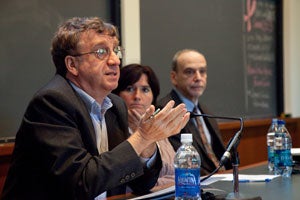Harvard Law School students should take full advantage of available resources to add significant international experience to their legal education. That was message delivered by HLS professors William Alford, Grainne de Burca, and Gerald Neuman in a panel discussion at HLS on the school’s offerings in international and comparative law.
Speaking to an audience mostly consisting of first-year JD and Master of Laws students during flyout week, the professors extolled the benefits of studying, interning, and working abroad in a legal context, and offered practical advice to internationally-minded students about how to get started.
Alford, vice dean for the graduate program and international legal studies, reminded students that they are required to take an international or comparative law course. “We thought this should be part of every JD’s legal education to, at this early stage, be exposed to a legal system other than of the United States, to see how people could organize a legal system on different premises,” he said.
Professor de Burca, whom Alford introduced as the “Bruce Springsteen in the European law field,” spoke more specifically about her own area of expertise. Having taught in Europe for over a decade both at Oxford University and the European University Institute in Italy before joining the HLS faculty this year, de Burca said her training abroad gives her a different perspective which students should think about when comparing classes.
“Teaching subjects like international law, we all bring to the subjects we teach certain cultural presuppositions and assumptions and I think that’s something you might want to bear in mind when choosing courses,” she said.
De Burca went on to explain why it is valuable for students enrolled in American law schools to study international and especially European Union law. Those focusing on economic law may want to study how the largest trading bloc in the world interacts with the US as an important trading partner, whereas those interested in international cooperation can look at how a continent fraught with war over the centuries has managed to maintain peace among member states since the creation of the EU in 1952.
“(The EU) is many things: it’s a regional trade system, it’s a regional human rights system, it‚s a regional constitutional system, so there are many different reasons you may be interested in taking (courses about) it,” she said.
Neuman, who teaches international, foreign, and comparative law, wrapped up the talk with a discussion of practical ways in which students can bring some international flavor into their years at HLS.
He urged students to recognize what international-oriented courses would work best for their individual needs and learning styles: some may choose to warm up to a field gradually by taking classes on a broad overview of a foreign legal system then move on to specialized areas, while others may want to immediately “plunge” into an advanced course in a field to which they are strongly attracted.
“You should consider what the right strategy is for you. You should also consider the balance among classroom learning…(and) experiential learning,” he said, referring to legal clinics, individual research projects, journals, moot courts, and HLS events featuring various legal experts.
—Joanne Wong
